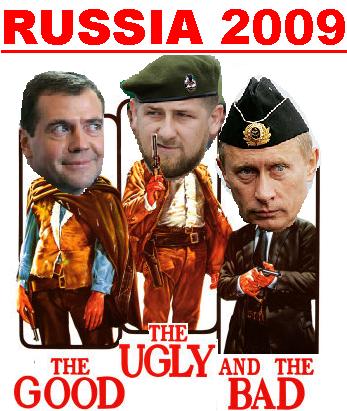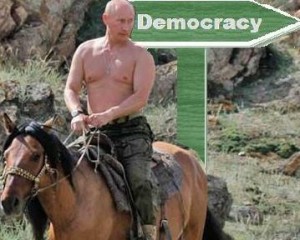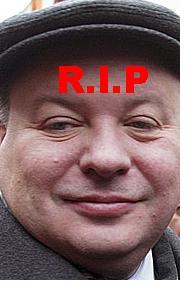
In 2009, did Russia celebrate or mourn 10 years of Putinism?
RUSSIA REBORN?
While experts can debate the extent, there is no doubt that the country has grown at least a little bit richer and stronger under Putin.
However, as Daniil Kharms observed, the bigger the cucumbers in the shops, the better they can be used to bludgeon people on the head:
Tikakeyev took the biggest cucumber out of his bag and hit Koratygin on the head with it.
Koratygin clutched his head with his hands, fell over and died.
That’s the size of the cucumbers sold in the shops these days!
And indeed, during most of the last decade, Russia had in some ways come to resemble a rentier state. As long as high oil prices trickled down to the masses and a strong state provided security, people were expected to shut up and put up. But this year’s economic crisis disrupted this quid pro quo: as the size of cucumbers in the shops began to shrink, they also began to seem less scary in the hands of the state, and people started to stir.
Thus, a year that began with riots over used car tariffs and later massive rebellions in factory towns like Pikalevo saw Putin offer large concessions to striking workers and Medvedev give an interview to the dissident newspaper Novaya Gazeta. Moreover, whilst journalists and human rights workers continued to be killed, 2009 was notable for being the first time that anyone was ever convicted for the crimes.
THE UGLY:
For all its gleaming Moscow skyscrapers, 2009 painfully exposed Russia’s ageing Soviet-era infrastructure, attitudes to fire safety and vulnerability to terrorism.
As if that were not enough, the murders of Estemirova, Markelov and Baburova made Russia officially the most dangerous place for journalists.
Much of the trouble came from Russia’s achilles heel: the restive caucuses. Ironically, just shortly after Dmitry Medvedev delivered his own ‘Mission Accomplished’ speech regarding the conflict in Chechnya, Yevkurov, the president of neighbouring Ingushetia, barely survived a major assassination attempt. Things have gone downhill from there, with human rights NGO Memorial voting to resume their activities in Chechnya due to the rising violence. The cycle of revenge-fuelled violence will continue to smoulder well into 2010.
THE BAD:
His more conciliatory rhetoric did not prevent Medvedev from cracking down on domestic opponents, even if they were shouting nonsense slogans such as ‘Pull the blanket! Cut the Pies!’ like the arist-provocateur Loskutov.
Despite conclusive evidence of the disastrous consequences of climate change for the country, Russia continued to bury its head in the sand about global warming. In fact, many Russians would like to see their world get a bit warmer.
There were some unsettling signs of an unofficial rehabilitation of Stalin, even if some of these were blown out of proportion by Western media.
 And 2009 also saw Russia return to its traditional sport of election rigging, with the questionable results in Sochi and Murmansk outdone by the massive fiasco that was the local elections, in which the ruling United Russia party scooped up 80% of the total votes and certain votes definitely disappeared.
And 2009 also saw Russia return to its traditional sport of election rigging, with the questionable results in Sochi and Murmansk outdone by the massive fiasco that was the local elections, in which the ruling United Russia party scooped up 80% of the total votes and certain votes definitely disappeared.
The good news, if one is being facetious, is that a reliable poll showed that “the majority (60%) of Russians said that the ruling party did not go far enough: that it would be better if the president controlled both the courts and the parliament…and nearly 25% said the Soviet Union had a better political system that the current Russian model (36%) or that in Western countries (15%). 26% believed that democratic governing was not suitable for Russia.
THE GOOD
But there were some genuinely good news for Russia in 2009, especially on the foreign policy front.
After a rocky start, the reset button looks to finally have taken effect in relations with the USA. Unusually for a democratic administration, Obama agreed to back down on the European ABM shield. And the two countries are on the verge of signing the first breakthrough arms control agreement since the end of the cold war. Russia is also playing a key and contructive role in the Iran negotiatings, even if it is not yet prepared to fully engage with the Nato effort in Afghanistan.
There was good news on the civil society front as well: Dmitry Medvedev followed up his interview with the dissident Novaya Gazeta by ensuring the successful trials of the killers of Novaya Gazeta journalists Politkovskaya and Baburova, even if there remains some doubt about these.
He has also injected some pluralism into the ruling party, which has lately been allowing some opposing voices to be heard in high policy circles, notably from Igor Jurgens.
And although polls have shown that most Russians feel disempowered politically, a group of plucky workers from the town of Pikalevo succeeded in grinding the country to a halt and extracting huge concessions from an embarassed Putin.
Despite a demographic decline, Russian society has become more developed since Putin has taken over. According to the most recent UN Human Development Index, ‘In the mid-2000s, Russia became a country with a high level of human development, achieving an HDI score above 0.800. The number of regions, where the index was at high levels, grew significantly – from 4 in 2004 to 12 in 2006, with Moscow moving ahead of Central & Eastern Europe’. Many problems remain, including vast inequalities between regions and income groups, but the development is a welcome sign.
Last but not least, 2009 gave us TAJIK JIMMY, Russia’s much awesomer answer to Susan Boyle.
PERSON OF THE YEAR
 Following Time Magazine, which gave its award to Bernanke for solving a crisis in a way that was only successful when compared to an overblown hypothetical catastrophe (a full scale collapse of western civilisation) rather than on its own merits (a giant transfer of wealth to banks with few strings attached and little structural reform), FPA Russia blog names Yegor Gaidar its Man of the Year.
Following Time Magazine, which gave its award to Bernanke for solving a crisis in a way that was only successful when compared to an overblown hypothetical catastrophe (a full scale collapse of western civilisation) rather than on its own merits (a giant transfer of wealth to banks with few strings attached and little structural reform), FPA Russia blog names Yegor Gaidar its Man of the Year.
This recently deceased right wing economist was responsible for ushering Russia’s darkest period in living memory, tarnishing the words ‘democracy’ and ‘market’ for entire generations, and paving the way for Putinism.
Yet, compared to an imaginary hypothetical alternative that he dreamt up himself, his reforms werent so bad after all. ‘If we did not act decisively, in two or three months we would have an economic and political catastrophe, total collapse and civil war,” he said in December 1991′.
Lest we forget, no matter how statist the Putin-Medvedev model becomes, its essential economic underpinning – supply side based market authoritarianism – is Gaidar’s most lasting legacy.
MOST UNEXPECTED EVENT 2009:
-> United Russia wins 80% of local election seats.
ACTUALLY UNEXPECTED EVENT 2009:
-> Obama walks the talk of US-Russia reset, backs away from ABM system in Europe
IN 2010, WATCH OUT FOR:
-> What will become of Khodorkovsky. Ex-Oligarch’s fate will be a litmus test of Medvedev’s commitment to reform and relationship with Putin
-> The complete disintegration and collapse of the USA, according to Russian academic Igor Panarin (this will probably not happen, -ed.)